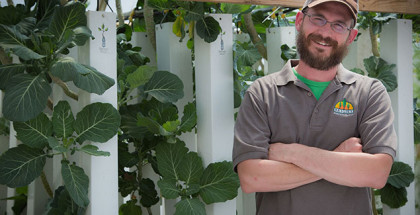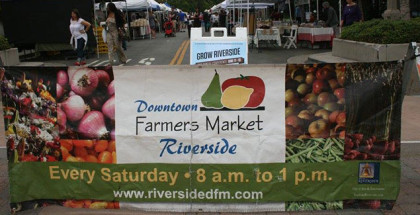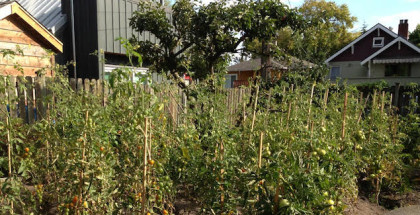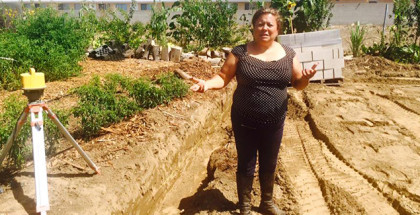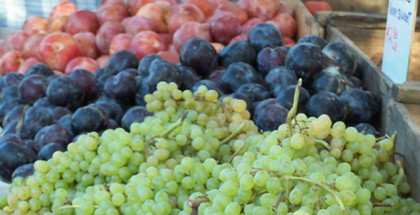Conference News
Where Buffalo Roam, Vertical Growing Towers Rise to Propel Local Agriculture
January 20, 2016 | Trish Popovitch
American Pavilion at 2015 World’s Fair. Courtesy Amy Storey.
By focusing on building a quality product, encouraging community and supporting their farmer customers, Laramie, Wyoming-based Bright Agrotech looks to have a bright and busy future ahead of it.
The company has continued to grow since Seedstock first profiled them here in 2012, something CEO and founder Dr. Nate Storey attributes to the broad appeal of the company’s mission.
“No matter if you’re like the uber liberal kind of person on the left side of things, or a super conservative person on the right side of things, everyone can get on board with the idea that local production is better,” says Storey. “Everyone can get on board with the idea that when we spend money in our communities, that money stays in our communities.” Read More
Citrus Day Set for Growers and Industry Professionals at UC Riverside on Jan. 27
January 19, 2016 | Sean Nealon
Mikeal Roose is a professor of genetics and the chair of the Department of Botany and Plant Sciences at UC Riverside. Photo credit: L. Duka.
Press Release – RIVERSIDE, Calif. (www.ucr.edu) — The University of California, Riverside will host the 5th annual citrus field day for citrus growers and citrus industry professionals on Jan. 27 at the university’s agricultural operations fields.
The event, which will includes a mix of presentations and field tours, is scheduled from 8 a.m. to 3 p.m. Advance registration, which is $25, is required. The deadline is Jan. 22. There will be no day-of-event registration available.
To register visit: https://form.jotform.com/53556635957975. For more information call 951-827-5906.
The following is a tentative schedule for the event: Read More
Looking forward, Riverside Food Systems Alliance Sets Eyes on Education, Health, and Local Food in the Region
January 19, 2016 | AJ Hughes
The Riverside Food Systems Alliance is striving for a thriving and equitable local foods system in Riverside and the surrounding areas. (Image courtesy Seth Wilson/Riverside Food Systems Alliance)
The Riverside Food Systems Alliance (RFSA), a public-private partnership with members from the community, government, and business sector works to grow a resilient and productive local food and agricultural system in the greater Riverside, CA region. The organization, which has been around for a little over a year continues to trace and mark its progress by looking back, and forward, to annual GrowRIVERSIDE conferences.
In 2014, the year of the first GrowRIVERSIDE event, consultant and former Seattle City Councilman Richard Conlin helped the group get established. With an original focus on Riverside’s Greenbelt, Conlin assisted in hammering out goals that would positively impact the community. These goals include sustainable agriculture and its economic viability in and near Riverside, California; agricultural economic development and infrastructure; education about food and agriculture; equitable access to healthy foods; and public health.
Shortly after the 2015 GrowRIVERSIDE conference, the RFSA formed a five-member board and an advisory board of more than 20 members. The organization also became a nonprofit with official 501(c)(3) status, hired a new executive director and secured a fiscal sponsor—Community Partners. Read More
USDA Expands Microloans to Help Farmers Purchase Farmland and Improve Property
January 19, 2016 | USDA USDA WASHINGTON, Jan. 19, 2016 — Agriculture Deputy Secretary Krysta Harden today announced that the U.S. Department of Agriculture (USDA) will begin offering farm ownership microloans, creating a new financing avenue for farmers to buy and improve property. These microloans will be especially helpful to beginning or underserved farmers, U.S. veterans looking for a career in farming, and those who have small and mid-sized farming operations.
WASHINGTON, Jan. 19, 2016 — Agriculture Deputy Secretary Krysta Harden today announced that the U.S. Department of Agriculture (USDA) will begin offering farm ownership microloans, creating a new financing avenue for farmers to buy and improve property. These microloans will be especially helpful to beginning or underserved farmers, U.S. veterans looking for a career in farming, and those who have small and mid-sized farming operations.
“Many producers, especially new and underserved farmers, tell us that access to land is one of the biggest challenges they face in establishing and growing their own farming operation,” said Harden. “USDA is making it easier for new farmers to hit the ground running and get access to the land that they need to establish their farms or improve their property.” Read More
CityCrop Venture Seeks to Address Future Water Needs of Urban Agriculture Operations
January 18, 2016 | AJ Hughes
A plot of land in Vancouver, British Columbia has served as the site of a research study to determine the water needs of urban agriculture. (Photo courtesy Mark Johnson)
Cities around the world are transforming blight into gardens, turning bleak rooftops into greenspace, and using empty buildings for vertical farming. But will this upsurge in urban agriculture create even more demand for water?
This is the question Mark Johnson, professor of water and sustainability at The University of British Columbia, is looking to address. Johnson, along with other colleagues, has developed a tool to measure just how much water urban agriculture operations need.
The tool, dubbed CityCrop, uses LiDAR (remote sensing technology—stands for Light Detection and Ranging) and climate readings to determine the level of shade provided by buildings and trees. This data helps scientists figure out city-dwelling plants’ rates of evapotranspiration, which in turn reveals their water needs. Read More
Citrus Curator Given Endowed Chair to Support UCR’s Citrus Variety Collection in Perpetuity
January 14, 2016 | Sean NealonRIVERSIDE, Calif. (www.ucr.edu) — Tracy Kahn, curator of the University of California, Riverside’s Citrus Variety Collection, has been appointed the Givaudan Citrus Variety Collection Endowed Chair.
The appointment, which went into effect July 1, 2015 and runs through June 30, 2020, allows the collection to be supported and maintained in perpetuity. It was made possible by a $1 million endowment from Givaudan, a Swiss-based company that is the global leader in the creation of fragrances and flavors.
Kahn has been the curator of the Citrus Variety Collection, one of the world’s most diverse assemblages of citrus cultivars and their relatives, since 1995. The collection consists of at least four trees each of more than 1,000 citrus cultivars, including cultivars developed at UCR, new and heirloom cultivars and citrus relatives introduced from around the world since the collection was established in the early 1900s. Read More
Grassroots Efforts Target Food Insecurity in San Bernardino County, CA
January 14, 2016 | AJ Hughes
A feast is enjoyed at Huerta Del Valle Community Garden in San Bernardino County. (photo courtesy of Arthur Levine/Huerta Del Valle)
San Bernardino County, the largest county in the United States, stretches all the way from Southern California’s Inland Empire to the California-Nevada state line.
In addition to numerous farms and other agricultural businesses, the county is home to Amy’s Farm, a polyculture-oriented farm in Ontario with a focus on education; Huerta del Valle, a robust community garden in Ontario; and the Upland-based Incredible Edible Community Garden.
Thanks to people like Arthur Levine, local and urban agriculture in San Bernardino County is experiencing a burgeoning grassroots movement. Read More
Sparks, Nevada Passes New Urban Agriculture Ordinance
January 13, 2016 | Davina van BurenResidents of Sparks, Nevada now have a lot more options when it comes to farming inside city limits.
In October, city council members voted unanimously to approve a new urban agriculture ordinance that allows for community gardens to be built on vacant or blighted plots in the city. Citizens will also be allowed to raise chickens and bees on private properties.
According to City Manager Steve Driscoll, the revamp of the city’s zoning codes had been in the works for quite some time. As a result of the housing recession, the city council wanted to take a fresh look at what would make the smartest uses of available land and zoning designations.
“In the late 1990s, we were building 300-400 new houses a year in Sparks,” says Driscoll. “From 2003–2005, we were building 2,500 houses a year. In 2008, we built zero. We looked at all our building processes and asked, ‘What lessons did we learn? If we ever ramp up and do that number of houses again, what would we do differently?’” Read More

